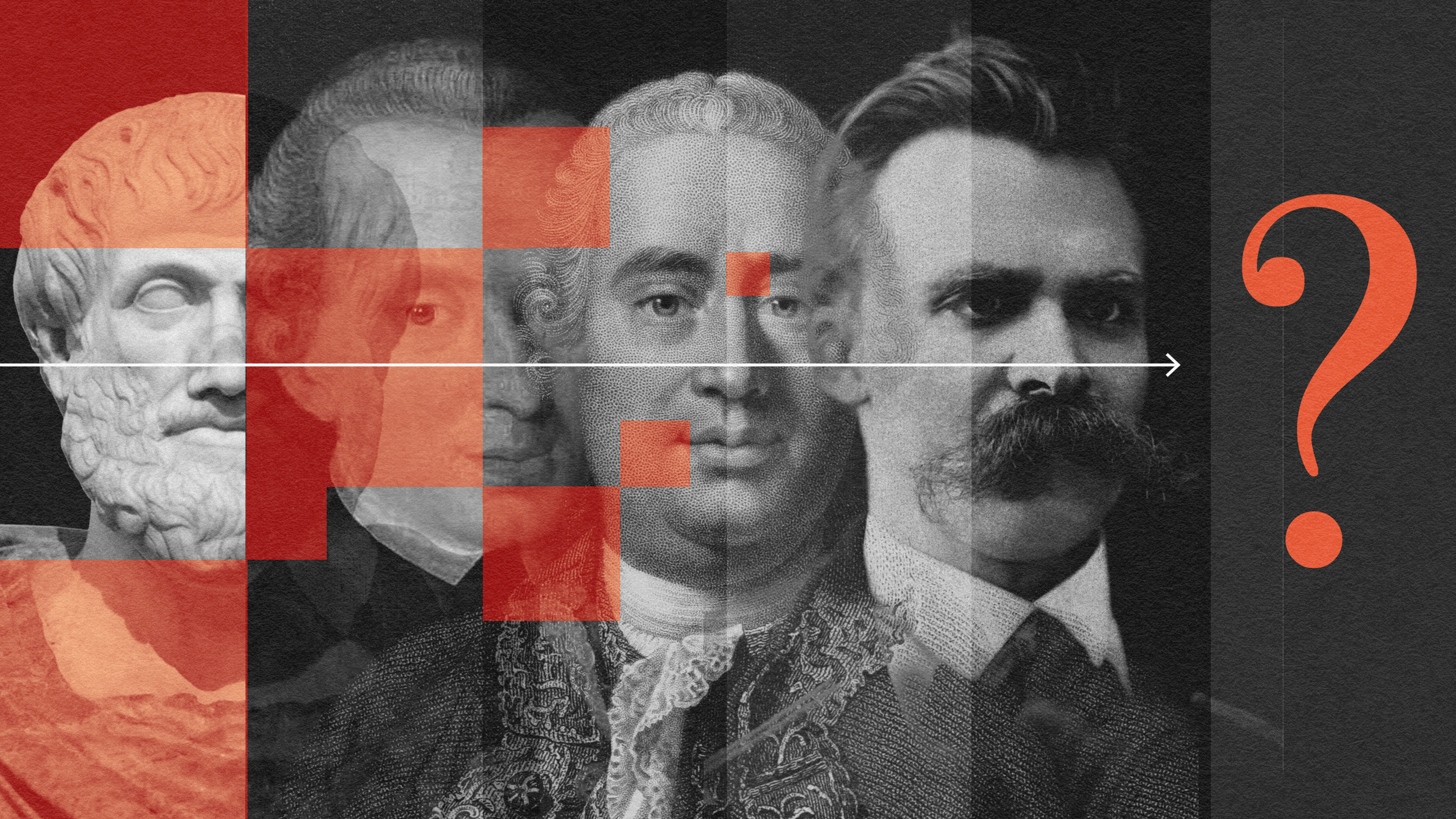What can we laugh at and why? The philosophy of humor

Adobe Stock/BigThink
- People like things that make them laugh, but have we considered if that is a good thing?
- Some philosophers, including Plato, thought comedy was bad for you.
- Most modern thinkers tend to get away from that, but still debate what should and shouldn’t be laughed at.
Most people enjoy a laugh now and then. Some have posited that laughter is the best medicine. Others have achieved fame and fortune by making people laugh. Laughter is one of the great universals of the human experience, even if people from different cultures tend to find different things funny. With that knowledge, it may surprise you to learn that most philosophers have taken a negative view of comedy, laughter, and humor throughout history.
Today, we’ll look at that history and what modern thinkers have to say about it. Using these insights, we can then try and make sense of the never-ending debate over what should and should not be the subject of a joke.
Believe it or not, the same people who debated the existence of chairs for two millennia had some differing ideas on what humor was and if it was good or not. Plato famously thought that comedy was bad, vicious even, and that most if not all laughter came at somebody else’s expense. He viewed laughter as a “passion,” and considered being taken by it as a loss of self-control, as did many philosophers before him. In “Republic,” he proposes that in his utopian city certain important people should never laugh and that strict censorship should keep objectionable, presumably hilarious works away from people.
Several centuries later, the great stoic philosopher Epictetus encouraged people to “Let not your laughter be loud, frequent, or unrestrained” and, allegedly, never laughed once in his life, which he considered a point of virtue.
Most of Western Philosophy took its cues from Plato and the stoics for a very long time and spoke poorly of humor as a result. Many famous thinkers, such as Thomas Hobbes and Rene Descartes, attributed most laughter to a sense of superiority over others.
However, Immanuel Kant, the famously boring philosopher, went in another direction. He supported the idea that laughter was caused by the incongruity of what we expect to happen and what happens. A good joke, he reasoned, builds up expectations, which it then resolves “into nothing.” This idea, that humor is based on differences in expectations and reality, is prevalent in both philosophy and psychology.
He even provided a series of jokes to explain himself, the best example being:
“The heir of a rich relative wished to arrange for an imposing funeral, but he lamented that he could not properly succeed; ‘for’ (said he) ‘the more money I give my mourners to look sad, the more cheerful they look!'”
Despite this, Kant and the philosophers who agreed with him didn’t think comedy was “good” per se. They’re just suggesting that laughs not based on malice are possible. It has only been recently that philosophers have paid much attention to the pro-comedy minority. This becomes even stranger when you realize how many heavy hitters are on that team.
Aristotle, the most famous student of Plato, continued his policy of disagreeing with this teacher by deciding that comedy could be okay. He argued that living a good life requires that you enjoy yourself from time to time and that humor is a part of that. He further maintained that being witty is a virtue.
St. Thomas Aquinas, a great philosopher in his own right, largely agreed with Aristotle and expanded on these notions. He argued that, as sleep provides physical rest, laughter provides psychological rest. He also noticed the social benefits of laughing with other people. These ideas have been expanded on by other writers up to the present day.
We have even reached a point where many public intellectuals will incorporate wit into their work on purpose. Most notable among these people are Slavoj Žižek, who makes enough jokes to fill a book, and Bertrand Russell, whose quotes include moments of absolute hilarity.
While most people probably wouldn’t consider being funny a “virtue” in the same way that Aristotle did, his ideas on humor, often called the “play” theory, are likely the foundation of most people’s understanding of what humor is and if it is of any use or not.
Of course, even if you take the view that humor is a good thing, or even just that it isn’t inherently bad, there is still the question of how to use it properly. For this, we’ll have to turn to the never-ending debate over the ethics of humor.
Even after addressing the problem of whether comedy is good, bad, or neutral, the issue of what can be the subject of laughter still has to be resolved. As we’ve seen, this issue goes back to Ancient Greece. It should surprise nobody that we still debate it. But what should and shouldn’t we joke about? Is there a clear line? Does context matter? Professor John Morreall of William and Mary can provide us some guidance. He has worked in the philosophy of humor for decades and has written several essays, articles, and books on the subject.
He restates in his essay “The Good, The Bad, and the Funny: An Ethics of Humor” a proposal that he has made before; that a general principle can be applied to humor, “Don’t play with something which you should take seriously.”
This seems like a simple enough idea; if matches aren’t something to be played with, then perhaps racial stereotypes aren’t either? But where is the line in cases like this?
To explain how this might be used, he offers examples of broad categories of jokes that rely on making fun of certain types of people. In the classic “Dumb Blonde” joke, the idea that all blondes are a bit slow is entertained. However, Dr. Morreall argues that to find the joke funny doesn’t require that we really believe that blondes are stupid nor that anybody thinks the moon is closer than Florida.
It is possible to play with these notions without taking them seriously or coming away from the joke with a bias towards blondes. Other jokes cross the line, though. Some harmful stereotypes that people believe can be kept in circulation through jokes, or reinforced in a way that causes harm later. In these cases, it may be morally objectionable to use the stereotype for laughs due to the harm it can cause elsewhere. A similar line of reasoning exists for jokes that utilize issues of deadly seriousness; some things should not be made light of for fear of causing us not to take them seriously.
An example of a line crosser Dr. Morreall cites in several of his essays is the cover of National Lampoon’s “Dessert Issue.” In a spoof of the cover of the “Concert for Bangladesh” album, the magazine depicts a starving child in the form of a partially eaten chocolate statue.
The argument here is that by making the cover of a famous aid concert the subject of mockery, we can belittle the severity of the issue of the humanitarian crisis it refers to.
On the other hand, Dr. Morreall also argues that there are many positives humor can bring. He mentions the joy it can bring, the social benefits of being able to laugh with friends, the ability of a good pun to lower tensions, and the ability of many jokes to let us step back and consider the absurdities of a topic we don’t notice when we’re too close to the situation.
Given the universality of laughter, humor seems to be one of the more important elements of the human condition. While philosophy has taken a strangely negative view of it for most of its history, more recent thinkers have begun to tout the benefits of a laugh now and then.
So go on, enjoy a lousy pun. It’s probably virtuous.





